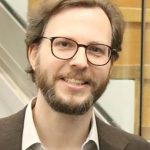Variable Reluctance Energy Harvesting
Content of the lecture:
Kinetic energy sources are commonplace in many different application scenarios and particularly in industrial settings. Within kinetic energy harvesting, the electromagnetic principle has been a popular choice due to its robustness, low cost, and relatively high power outputs. Normally, electromagnetic energy harvesters are implemented by creating a relative motion between permanent magnets and coils, utilizing Faraday’s law to induce a voltage in the coil due to a change in the magnetic flux. However, this flux change can be created in different manners. In a variable reluctance system, coils and magnets do not move with respect to each other, but a reluctance change – and thus a change in flux – is created by changes in the magnetic circuit.
In this lecture, the basic principle of variable reluctance energy harvesting is being introduced, and based on the case of a rotating system, the design of a variable reluctance energy harvesting system is discussed. The lecture, moreover, presents solutions to a number of challenges in variable reluctance energy harvesting, including the structural optimization of the harvester to maximize power output, the reduction of parasitic effects of the harvester, as well as the design of a single-anchor variable reluctance energy harvester.
Teacher: Prof. Sebastian Bader
Sebastian Bader is an associate professor of embedded systems with the Department of Computer and Electrical Engineering at Mid Sweden University. His research interests are focused on energy aspects of low-power sensor systems, with current research activities in the areas of energy harvesting, low-power IoT systems, and tiny machine learning. Within energy harvesting, Sebastian has an interest in low-power photovoltaic systems, as well as kinetic energy harvesting. He is also interested in the design methods and tools for the design automation of such systems. Sebastian has been a visiting researcher in Australia and the United Kingdom, and is active in several international projects, conferences and committees.

